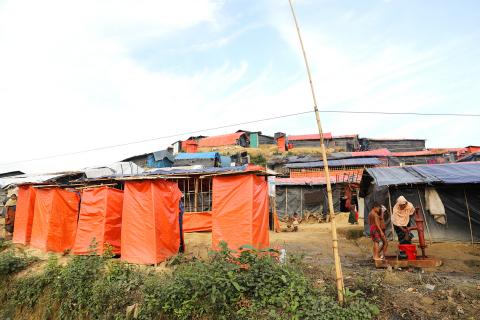Bangladesh plans to allocate more land for camps housing Rohingya refugees as concerns grow over a possible outbreak of disease in crowded, makeshift settlements clustered at the country’s southern tip.
About 625,000 Rohingya Muslims have fled to sanctuary in Bangladesh from violence, looting and destruction in Myanmar after government forces launched a counter insurgency following attacks by Rohingya militants on Aug. 25.
The swift exodus has taken the Rohingya refugee population to 837,000, making Bangladesh one of the world’s largest, most crowded settlement of asylum seekers.

Photo: Reuters
More than 60 percent of the water supply in the camps is contaminated with bacteria as temporary latrines overflow into hastily-built, shallow wells, a WHO survey showed.
Fecal sludge in the settlements goes largely untreated.
“There is a high risk of a public health event, not just cholera and acute watery diarrhea,” said Naim Talukder of the group Action Against Hunger, who is coordinating the efforts of 31 groups and agencies to manage water, sanitation and hygiene.
Most refugees live in flimsy bamboo and canvas shelters in an area crowded well beyond emergency standards, International Organization for Migration (IOM) official Graham Eastmond said.
“You are talking a third of the international standard,” he said. “We need to decongest urgently and obviously, to do that, we need more land.”
The IOM is among the bodies that have urged Bangladesh to free up more land and allow a wider spread of settlements.
“The government already allocated 3,000 acres [1,214 hectares] of land for the Rohingya,” said Shah Kamal, a disaster management official. “Considering the current situation, the government is planning to allocate 500 acres more land for them.”
Bangladesh last week approved a US$280 million project to develop an isolated and flood-prone island in the Bay of Bengal to temporarily house 100,000 Rohingya, despite criticism from rights groups.
The overcrowding spells health and safety risks, Eastmond said, from rapidly spreading water-borne and communicable diseases to landslides and flooding, besides swelling the threat to vulnerable children and women.
Single women or children head about a fifth of households, preliminary findings of a population survey by the UN refugee agency and Bangladesh show.
By Nov. 11, there were 36,096 cases of acute watery diarrhea since Aug. 25, as infection rates climbed, UNICEF said last month.
Bangladesh, in partnership with UN agencies and charities, has spent hundreds of millions of dollars in responding to the crisis.
New roads built by the army will open this month, boosting access for camp-dwellers, Eastmond said.
Yet just 23 percent of funding needs for water, sanitation and hygiene services are being met, Talukder said.
Bangladesh and Myanmar vowed to begin the voluntary return of the Rohingya to Myanmar in the next two months, but the Rohingya will have to present identity documents in order to be accepted, Burmese officials said, and relief officials fear that few Rohingya carried such documents when they fled.

POLITICAL PRISONERS VS DEPORTEES: Venezuela’s prosecutor’s office slammed the call by El Salvador’s leader, accusing him of crimes against humanity Salvadoran President Nayib Bukele on Sunday proposed carrying out a prisoner swap with Venezuela, suggesting he would exchange Venezuelan deportees from the US his government has kept imprisoned for what he called “political prisoners” in Venezuela. In a post on X, directed at Venezuelan President Nicolas Maduro, Bukele listed off a number of family members of high-level opposition figures in Venezuela, journalists and activists detained during the South American government’s electoral crackdown last year. “The only reason they are imprisoned is for having opposed you and your electoral fraud,” he wrote to Maduro. “However, I want to propose a humanitarian agreement that

ECONOMIC WORRIES: The ruling PAP faces voters amid concerns that the city-state faces the possibility of a recession and job losses amid Washington’s tariffs Singapore yesterday finalized contestants for its general election on Saturday next week, with the ruling People’s Action Party (PAP) fielding 32 new candidates in the biggest refresh of the party that has ruled the city-state since independence in 1965. The move follows a pledge by Singaporean Prime Minister Lawrence Wong (黃循財), who took office last year and assumed the PAP leadership, to “bring in new blood, new ideas and new energy” to steer the country of 6 million people. His latest shake-up beats that of predecessors Lee Hsien Loong (李顯龍) and Goh Chok Tong (吳作棟), who replaced 24 and 11 politicians respectively

Young women standing idly around a park in Tokyo’s west suggest that a giant statue of Godzilla is not the only attraction for a record number of foreign tourists. Their faces lit by the cold glow of their phones, the women lining Okubo Park are evidence that sex tourism has developed as a dark flipside to the bustling Kabukicho nightlife district. Increasing numbers of foreign men are flocking to the area after seeing videos on social media. One of the women said that the area near Kabukicho, where Godzilla rumbles and belches smoke atop a cinema, has become a “real

‘WATER WARFARE’: A Pakistani official called India’s suspension of a 65-year-old treaty on the sharing of waters from the Indus River ‘a cowardly, illegal move’ Pakistan yesterday canceled visas for Indian nationals, closed its airspace for all Indian-owned or operated airlines, and suspended all trade with India, including to and from any third country. The retaliatory measures follow India’s decision to suspend visas for Pakistani nationals in the aftermath of a deadly attack by shooters in Kashmir that killed 26 people, mostly tourists. The rare attack on civilians shocked and outraged India and prompted calls for action against their country’s archenemy, Pakistan. New Delhi did not publicly produce evidence connecting the attack to its neighbor, but said it had “cross-border” links to Pakistan. Pakistan denied any connection to